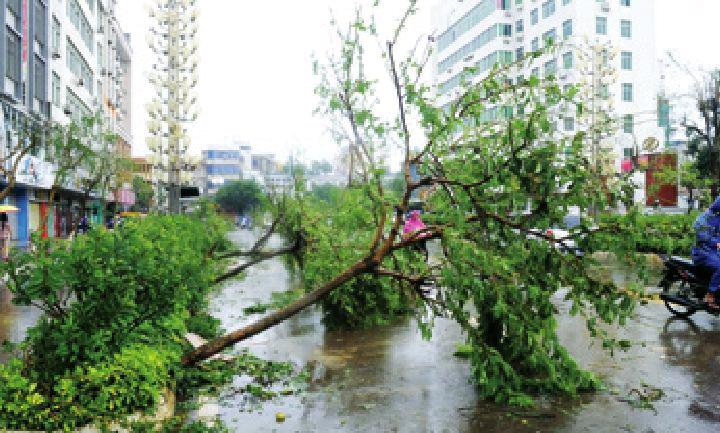Deadly Gales
2014-08-27
Typhoon Rammasun struck south China on July 18 and 19, bringing torrential rain, flooding and extreme winds to the countrys southern provinces, affecting nearly 10 million people in the provinces of Guangdong, Hainan, Yunnan and Guangxi Zhuang Autonomous Region. The typhoon caused 46 deaths, with another 25 reported missing. A total of 37,000 houses and 250,000 hectares of crops were destroyed, causing combined direct economic losses worth 33.6 billion yuan ($5.5 billion) in the affected area.
On July 23, typhoon Matmo made landfall in east Chinas Fujian Province, making it the 10th typhoon to affect the country this year so far.
Rights Studies
Five national education and training bases for human rights were set up in China on July 22, bringing the total number of such bases to eight.
The five institutions authorized to serve as education and training bases are the human rights research centers at Renmin University, Fudan University, Wuhan University, Shandong University and Southwest University of Political Science and Law.
“The move will help to promote faster and better development of Chinas human rights undertakings,” said Cui Yuying, Deputy Director of the Information Office of Chinas State Council, while addressing the audience at the ceremony.
Nankai University, China University of Political Science and Law, and Guangzhou University were authorized to serve as national education and training bases in October 2011 in accordance with the governments plan to promote human rights in China.
Teacher Exchange
China will set up a system to swap principals and teachers between schools to ensure even distribution of educational resources, according to the Ministry of Education.
In a statement released on July 21, the ministry said the move aims to arrange competent educational staff to guide the development of underdeveloped primary and middle schools, mostly in the countrys western regions.
The mechanism will be revealed in a future document and swaps will be implemented within counties on a regular basis in three to five years, it said, without specifying how long the swaps will last.
In 2011 and 2012, province-level governments signed a memo with the ministry to boost local educational balance through various measures, including funding and facility upgrades, and nearly 400 cities and counties nationwide had passed official evaluations as of last month.
However, on July 21 the ministry revealed that eight province-level regions did not see a single city or county pass evaluations, fingering inadequate government efforts.
The ministry vowed to monitor the educational gap between different regions on a regular basis and hold accountable those who fail to do their jobs.
Mile-High Wifi
A Chinese airline tested a program on July 23 that would allow passengers to use the Internet during flights, paving the way for the technologys application in Chinas booming aviation market.
The satellite-based Wifi service was made available on a flight operated by China Eastern Airlines, the first test of the service on a Chinese commercial flight. The service was launched on an Airbus A330 servicing the ShanghaiBeijing route.
The aircraft is installed with devices that use satellites to transmit signals, boasting better bandwidth and stability compared to communication via base stations, Zhang Chi with China Eastern Airlines told Xinhua News Agency.
The trial is an important step for inflight Wifi services to win approval from the countrys aviation regulators, who have yet to issue licenses for its commercial use. The trial will help collect data and passenger feedback for setting standards and rules, Zhang said.
Water for Temples
China will invest heavily into providing safe drinking water to all temples around the southwestern Tibet Autonomous Region within 2014, regional authorities announced on July 23.
The one-time investment of 495 million yuan ($79.2 million) will give 1,466 temples access to drinking water, according to the regional water resources department.
About 50,000 people, including monks, nuns, temple staff and nearby residents, will benefit from this project, said Chagxi, a senior official with the department.
The project is intended to end the difficulties Tibetan temples face in sourcing safe water as most of Tibetan Buddhist monasteries are located in mountainous or remote regions.
From 2005-13, China invested 2.22 billion yuan ($352.4 million) in supplying safe drinking water and water for other uses to rural Tibetan residents. To date, more than 86 percent of Tibets rural areas are served by tap water.
Nursing for the Elderly
Beds in Chinas nursing centers for the elderly have reached 4.94 million, according to Li Liguo, Minister of Civil Affairs, on July 21.
